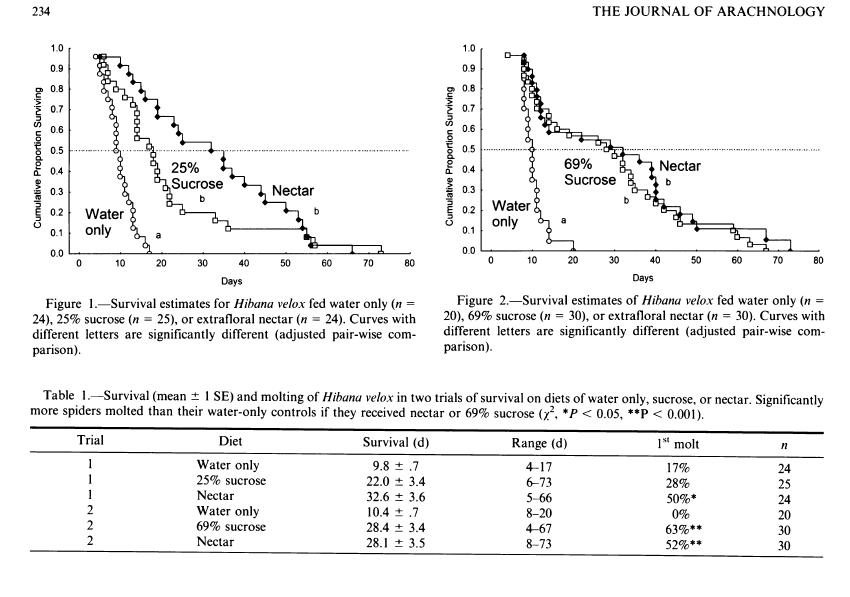S2000
Arachnopeon
- Joined
- Jul 15, 2012
- Messages
- 17
Hello everyone, I hope this content was not already briefed (I searched for it) due to the age of this article(2009). I was browsing JSTOR when I found this;
Plant Nectar Increases Survival, Molting, and Foraging in Two Foliage Wandering Spiders by Robin M. Taylor and Richard A. Bradley
Abstract:
We predicted that because plant nectar is high in energy, it is likely to provide multiple benefits to spiders that spend a substantial amount of energy foraging. In three laboratory experiments, we tested the effects of dietary extrafloral nectar on the survival, molting, and activity of two foliage wanderers, Cheiracanthium mildei L. Koch 1864 (Miturgidae) and Hibana velox (Becker 1879) (Anyphaenidae), both highly active, quick-moving nocturnal foragers. Extrafloral nectar contributed significantly to survival and molting in prey-deprived H. velox. On a marginal diet of prey (one Drosophila adult on alternate days) offered to spiders as soon as they emerged, 97% of C. mildei underwent their first molt if they also received nectar, compared to 7% of controls without nectar. On a marginal diet of prey (one Drosophila adult on alternate days) offered to spiders starting two days after their emergence, 78% of the spiders also receiving nectar molted, compared to 0% of controls without nectar. Video recordings of activity showed that prey-deprived groups of C. mildei maintained their active nocturnal foraging for many days on nectar, whereas controls became increasingly quiescent until they died. Non-web-building spiders that feed on nectar may utilize its energy for foraging and thereby allocate the nutrients of prey to maintenance and growth.
Stable url; http://www.bioone.org/doi/abs/10.1636/Sh07-69.1
Some visual info out of the article

Ok, so this research does suffer from a barely passing sample size. That said, the implications are quite amazing. Starved, these spiders survived over 3 times the length with sucrose/nectar than they did with just water. They also had a much higher rate of molting and activity (which they explained as running around a one minute period for 10 minute intervals @ 54 intervals). Is this a blessing or is it just "crack" for spiders and do you think that this could this be transposed for tarantulas? Has anyone used this application? Let me know what you think :coffee:
edit: two additional articles on similar topic (spiders found in nature positive for fructose, http://www.bulletinofinsectology.org/pdfarticles/vol63-2010-203-208chen.pdf + http://etd.ohiolink.edu/view.cgi?acc_num=osu1086114717 same author)
Plant Nectar Increases Survival, Molting, and Foraging in Two Foliage Wandering Spiders by Robin M. Taylor and Richard A. Bradley
Abstract:
We predicted that because plant nectar is high in energy, it is likely to provide multiple benefits to spiders that spend a substantial amount of energy foraging. In three laboratory experiments, we tested the effects of dietary extrafloral nectar on the survival, molting, and activity of two foliage wanderers, Cheiracanthium mildei L. Koch 1864 (Miturgidae) and Hibana velox (Becker 1879) (Anyphaenidae), both highly active, quick-moving nocturnal foragers. Extrafloral nectar contributed significantly to survival and molting in prey-deprived H. velox. On a marginal diet of prey (one Drosophila adult on alternate days) offered to spiders as soon as they emerged, 97% of C. mildei underwent their first molt if they also received nectar, compared to 7% of controls without nectar. On a marginal diet of prey (one Drosophila adult on alternate days) offered to spiders starting two days after their emergence, 78% of the spiders also receiving nectar molted, compared to 0% of controls without nectar. Video recordings of activity showed that prey-deprived groups of C. mildei maintained their active nocturnal foraging for many days on nectar, whereas controls became increasingly quiescent until they died. Non-web-building spiders that feed on nectar may utilize its energy for foraging and thereby allocate the nutrients of prey to maintenance and growth.
Stable url; http://www.bioone.org/doi/abs/10.1636/Sh07-69.1
Some visual info out of the article

Ok, so this research does suffer from a barely passing sample size. That said, the implications are quite amazing. Starved, these spiders survived over 3 times the length with sucrose/nectar than they did with just water. They also had a much higher rate of molting and activity (which they explained as running around a one minute period for 10 minute intervals @ 54 intervals). Is this a blessing or is it just "crack" for spiders and do you think that this could this be transposed for tarantulas? Has anyone used this application? Let me know what you think :coffee:
edit: two additional articles on similar topic (spiders found in nature positive for fructose, http://www.bulletinofinsectology.org/pdfarticles/vol63-2010-203-208chen.pdf + http://etd.ohiolink.edu/view.cgi?acc_num=osu1086114717 same author)
Last edited:
